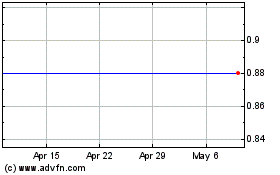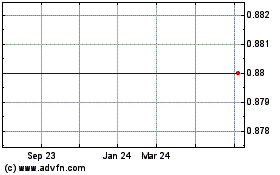By Nina Trentmann
This Thursday is expected to be the most popular day to report
financial results this earnings season. And, for some companies,
that could be a good thing.
Deciding when to report financial performance increasingly
involves a deliberate weighing of regulations, executive travel
plans and the timing of competitors' reports, all in an effort to
maximize -- or perhaps avoid -- attention from analysts and
investors.
"Investors are paying close attention to when companies release
earnings, " said Sandy Peters, the head of financial reporting
policy at the CFA Institute. "That's something that CFOs and heads
of investor relations should factor into their thought
process."
On Thursday, more than 420 companies listed in the U.S. are
expected to release earnings, which could be good or bad, depending
on the company, according to Wall Street Horizon Inc., a data
provider that tracks over 7,500 companies globally.
Reporting on a busy day can make it easier for companies to hide
disappointing results amid a tsunami of information from other
businesses. But a small company with good news to present might be
overlooked by the volume of corporate behemoths reporting on the
same day.
Attention paid toward companies' earnings -- measured by metrics
such as downloads of regulatory filings, Google searches and news
articles -- drops on popular reporting days, said Ed deHaan, an
associate professor of accounting at the University of Washington's
Foster School of Business.
Mr. deHaan and his colleagues analyzed the timing and impact of
120,000 results announcements in 2015 and found that trading
volumes of individual stocks also went down on busy earnings days.
Their findings were published in the Journal of Accounting and
Economics.
"The ecosystem of investors and intermediaries is
capacity-constrained, which results in a reduced response to
earnings releases on busy days," Mr. deHaan said.
Most U.S. companies report on Tuesdays, Wednesdays and
Thursdays, often in the third or fourth week after the start of the
earnings season, said Wall Street Horizon Chief Executive Barry
Star. Companies tend to avoid Fridays for fear their results
release might draw less attention ahead of the weekend, he
said.
"The myth is that companies that announce results on a Friday
try to escape the wrath of the market," he said. "But evidence
shows that this is not true." Market volatility can be stronger on
a Friday because of the overall lower number of earnings releases,
Mr. deHaan added.
Institutional traders consider earnings-release dates as
"corporate body language" and might use that language to inform
trades, according to Wall Street Horizon.
Competitors' timing matters, too. Software maker Citrix Systems
Inc., for instance, usually reports on a Wednesday, after the
market closes, alongside other companies in the sector, including
technology heavyweight Microsoft Corp. Because of that, not all
analysts covering the sector manage to dial into the company's
earnings call, said Traci Tsuchiguchi, vice president for investor
relations at Citrix.
The company is now reviewing whether it should permanently move
its earnings date, following unsolicited feedback from analysts and
investors after it changed its third-quarter earnings date to
Thursday morning, Oct. 24 -- a day after Microsoft.
Citrix merged its earnings date with an analyst day, Ms.
Tsuchiguchi said. "We were due for an update for our longer-term
targets," she said. "If you can get it all out on the same day, you
don't want to defer questions to a later analyst day."
Some parameters around companies' earnings releases are set by
regulators. The U.S. Securities and Exchange Commission requires
firms with $75 million or more in publicly traded shares to file
quarterly results no more than 40 days after the end of a reporting
period, and companies in Europe and Asia also need to abide by
tight regulatory deadlines.
It is important for a company to adhere to its chosen date once
it has made an official announcement, Mr. Star said. "If dates are
moved and appearances are canceled, this sends a signal to the
market," he said.
Hexo Corp., a Canadian cannabis company, delayed its earnings
release to Oct. 28 from Oct. 24 after it borrowed money a day
before its planned results day.
The company previously had withdrawn its outlook for fiscal year
2020 and reduced its revenue expectations to reflect slower than
expected store openings, pricing pressure and a delay in government
approval for certain cannabis products, according to a news
release.
Hexo needed extra time to finalize its filings after the
financing, the company said.
The company's share price initially rose after the news about
the financing on Oct. 23 -- the day when Hexo announced it would
move its earnings day -- but fell 5.7% a day later on Oct. 24 and
another 6% the following day, underlining investor concerns about
the company's outlook.
Closing at 2.86 Canadian dollars ($2.17) on the Toronto Stock
Exchange on Wednesday, the company's share price has nearly halved
in the past month, according to FactSet, a data provider.
"A CFO should know that all of their actions are being watched,"
said Wall Street Horizon's Mr. Star.
Write to Nina Trentmann at Nina.Trentmann@wsj.com
(END) Dow Jones Newswires
November 07, 2019 05:44 ET (10:44 GMT)
Copyright (c) 2019 Dow Jones & Company, Inc.
HEXO (TSX:HEXO)
Historical Stock Chart
From Mar 2024 to Apr 2024

HEXO (TSX:HEXO)
Historical Stock Chart
From Apr 2023 to Apr 2024
